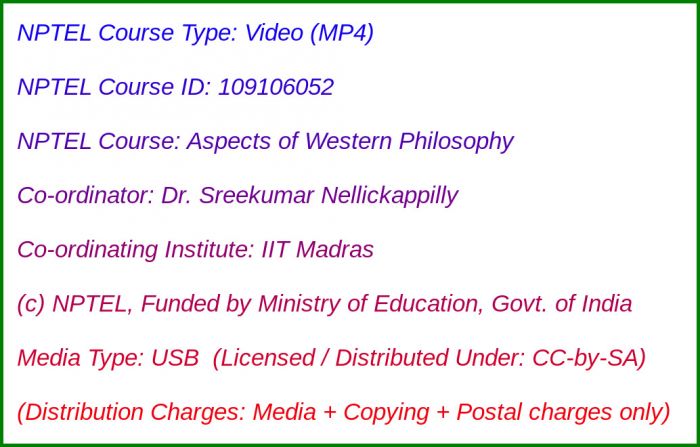
Media Storage Type : 64 GB USB Stick
NPTEL Subject Matter Expert : Dr. Sreekumar Nellickappilly
NPTEL Co-ordinating Institute : IIT Madras
NPTEL Lecture Count : 40
NPTEL Course Size : 31 GB
NPTEL PDF Text Transcription : Available and Included
NPTEL Subtitle Transcription : Available and Included (SRT)
Lecture Titles:
Lecture 1 - Greek Philosophy: Ionians, Pythagoras, Parmenides, Heraclitus and Democritus
Lecture 2 - Sophists, Socrates; philosophy of man; relativism and subjectivism; the idea of good
Lecture 3 - Platos idealism: theory of ideas
Lecture 4 - Plato: theory of knowledge, method of dialectic; theory of soul
Lecture 5 - Aristotles criticism of Platonic idealism and the concepts of Form and Matter
Lecture 6 - Aristotles theory of causation; potentiality and actuality
Lecture 7 - Medieval philosophy: St. Augustine and the Problem of evil; St. Thomas Aquinass concepts of faith and reason; proofs for the existence of God.
Lecture 8 - Modern Philosophy: mail characteristic features; renaissance and scientific revolution; rationalism and empiricism: main features.
Lecture 9 - Descartes: the method in philosophy; the concepts of doubt and indubitable knowledge.
Lecture 10 - Descartes: the mind-body dualism; the concept of God and proofs for Gods existence
Lecture 11 - Spinoza: the concepts of Substance, attributes and modes.
Lecture 12 - Spinozas pantheism-God and nature
Lecture 13 - Leibniz: Monadology; the mind-body problem revisited; concept of God; the concept of pre-established harmony
Lecture 14 - The empiricism of John Locke: ideas and their classification; refutation of innate ideas
Lecture 15 - John Locke: theory of knowledge; concept of substance; the primary and secondary qualities
Lecture 16 - Berkeley: the refutation of the distinction between primary and secondary qualities, immaterialism
Lecture 17 - Berkeleys critique of abstract ideas, esse est percipi, the problem of solipsism; God and self
Lecture 18 - Hume : Impressions and ideas, knowledge concerning relations of ideas and knowledge concerning matters of fact, induction and causality.
Lecture 19 - The external world and the self, personal identity, rejection of metaphysics, scepticism, reason and the passions.
Lecture 20 - Critical Philosophy: characteristic features; kantd objectives: the classification of judgements, possibility of synthetic a priori judgements, the Copernican revolution
Lecture 21 - Kant: forms of sensibility, categories of understanding; the process of knowledge acquisition; phenomenon and noumenon,
Lecture 22 - The Ideas of Reason-soul, God and world as a whole; antinomies; rejection of speculative metaphysics.
Lecture 23 - Kants ethics; freedom and immortality, problems with Kant.
Lecture 24 - Hegel : The conception of Geist (spirit), the dialectical method, concepts of being, non-being and becoming,
Lecture 25 - Absolute idealism; consciousness, self consciousness and reason.
Lecture 26 - Karl Marx: historical materialism; the significance of the proletariat; the base structure-superstructure division.
Lecture 27 - Nietzsche : Critique of western culture, religion and morality; will to power; the idea of superman.
Lecture 28 - Linguistic turn in British philosophy: Russells logical atomism and the refutation of idealism.
Lecture 29 - Wittgenstein : early Wittgensteins conception of language and reality; the picture theory of meaning
Lecture 30 - Later Wittgensteins conception of language games and forms of life; meaning and use.
Lecture 31 - Logical positivism; against metaphysics and a scientific conception of philosophy; the limitation of logical positivism
Lecture 32 - Husserl : Phenomenology and the methods of reduction; the principle of intentionality.
Lecture 33 - Phenomenological reduction, eidetic reduction and transcendental reduction; transcendental subjectivity; the pure subject.
Lecture 34 - Heidegger : phenomenological hermeneutics; concept of Being; man as being-in-the-world; destruction of the western intellectual tradition.
Lecture 35 - Authentic and inauthentic existence; Truth as disclosure
Lecture 36 - Existentialism: main features; existence precedes essence; freedom and responsibility; finiteness and situatedness of human existence
Lecture 37 - Sartres conception of human existence; man is condemned to be free; rejection of essentialism
Lecture 38 - The concept of being-in-itself, being-for-itself and being-for-others
Lecture 39 - Postmodernism: major trends and chief characteristic features; conceptions of human subject; different postmodern approaches
Lecture 40 - Deconstruction, feminism, discourse theory etc.

